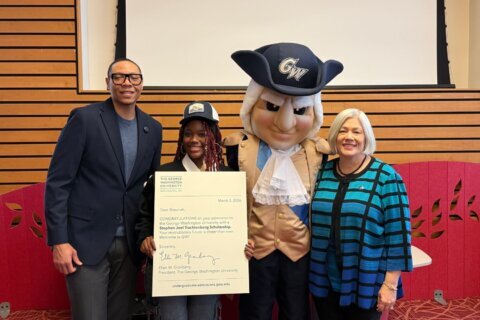D.C. Mayor Muriel Bowser presented her fiscal 2025 budget to council members Wednesday, explaining program cuts and some tax increases are needed to account for a $700 million deficit.
The $21 billion plan, called “Fairshot: Strategic Investments and Shared Sacrifice,” includes an increase in per-pupil funding for city schools, and investments in D.C.’s downtown and public safety initiatives.
But it also includes cuts to the D.C. Circulator and programs such as the Early Childhood Educator Pay Equity Fund, which gives day care teachers stipends.
The concessions, Bowser told council members, are the result of several factors: post-pandemic economic conditions, slowing economic growth, the end of federal stimulus funding and higher operating costs.
D.C. is facing a $700 million deficit this year, and is facing a $4 billion gap in funding through fiscal 2029.
Still, Bowser said the plans address “the reality we’re in right now.”
“We want to be a city that people are excited about,” Bowser told council members. “I say to many people, ‘Nobody wants to be a city where people are leaving, businesses are failing.’ And my hope is that throughout this budget process, we’re able to stick together to keep Washington an attractive place for residents, business and visitors.”
Now, the council has 70 days to consider and approve the budget, Chairman Phil Mendelson said.
Here’s a look at some of what’s included in the budget.
Taxes
Bowser is proposing an increase to the city’s sales tax from 6% to 6.5% in fiscal year 2026. It would increase to 7% the next year.
The change, she said, is needed to help cover increased Metro costs.
Bowser hopes council members avoid property tax increases on residents.
“Where we drew the line, and I hope that the council maintains this line, is not increasing property taxes on our residents, or on our commercial property owners,” Bowser said.
The city is also proposing an 80-cent fee on hotel room stays to support increased public safety hiring.
Public Safety
D.C., Bowser said, is allocating $8.7 million toward adding 40 new Community Safety Officers. About $3.4 million would go toward crime-fighting technology, such as tasers and upgraded software for license plate readers.
Over $3 million would be used fingerprint, drug and DNA sample testing.
Schools
D.C. is proposing boosting school funding for students, increasing the Uniform Per Student Funding Formula by 12.4%.
The city is also investing $4.8 million in high-impact tutoring, a program it has offered using federal stimulus funding and that has proven to be effective at decreasing absenteeism.
City leaders want to invest $6.8 million to support out-of-school time programming, and use $17 million to renovate Ward 5’s Advanced Technical Center, to help provide healthcare services and training.
Still, some schools are going to have to cut positions. Ward 6 Council member Charles Allen said he’s heard that some schools are figuring out if they can stop buying supplies such as paper in an effort to prevent having to lose staff members.
“When we sent their budgets, we thought there would be more positions impacted, to be quite honest with you,” Bowser said at a news conference after the council hearing. “What we’re seeing is some right-sizing of the number of adults in buildings.”
School staffs increased during the pandemic, Bowser said, because of federal stimulus funding.
What’s being cut?
Concessions in the budget were necessary because of decreasing revenue projections, city leaders say. Since 2010, revenues have grown 6% per year. But from fiscal years 2024 to 2028, revenues are expected to grow just 2%, the city says.
Some programs, such as the D.C. Circulator bus, would be cut entirely under Bowser’s proposal. However, the budget funds the Circulator for six months, so the city can figure out how to transition away from the program. It expects WMATA to fill the gaps, because the agency is in need of buses and drivers.
“The D.C. Circulator is a program that quite frankly did not recover its ridership after the pandemic,” City Administrator Kevin Donahue said. “MetroBus ridership is at almost what it was in pre-pandemic times. We’ve also seen vast increases in Capital Bikeshare, and in the stand up scooter rentals.”
Bowser is also proposing entirely cutting the Early Childhood Educator Pay Equity Fund, an initiative that gives stipends to day care teachers.
That proposal drew criticism from several lawmakers Wednesday, including Council member Christina Henderson.
“There is no other group of women who you’re saying, we told them, ‘There is a career path for you in early childhood, go get your associate’s degree, go get your bachelor’s degree.’ But now we are telling you, you have to go back to making minimum wage,” Henderson said.
In deciding which programs to cut, Donahue said the city considered whether the service was essential, such as trash collection. They also considered whether cutting a program would lead to somebody losing their life or affect their safety.
The city reviewed programs that have data that could prove they’re effective, “so newer programs that had not yet rolled out were more likely to be cut,” he said. It also considered rate of growth for different programs.
Cutting the Early Childhood Educator Pay Equity Fund falls into a different category, Donahue said, because, “We had that program to make adjustments, to keep its growth in line with the revenue growth. But the day after when we were supposed to finish the budget is when we got the written requirement from the CFO to fully fund that reserve,” meaning the city had to make more cuts.
More information about Bowser’s proposed budget is available online.
Get breaking news and daily headlines delivered to your email inbox by signing up here.
© 2024 WTOP. All Rights Reserved. This website is not intended for users located within the European Economic Area.








